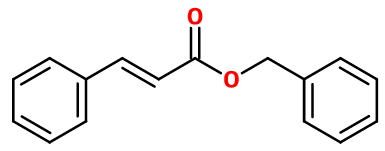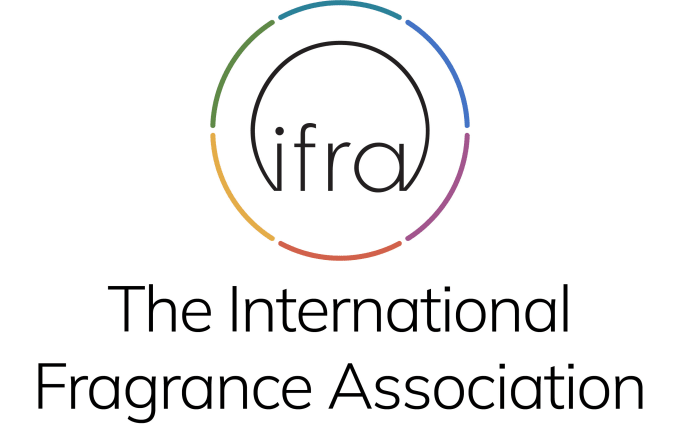
Photo credits: ScenTree SAS
Benzyl cinnamate
Benzyl 3-Phenylprop-2-enoate ; Benzyl 3-phenyl propenoate ; Benzyl alcohol cinnamate ; Benzyl gamma-phenyl acrylate ; Benzyl-3-phenyl propenoate ; Cinnamein ; Phenyl methyl 3-phenyl-2-propenoate ; Phenylmethyl 3-phenylprop-2-enoate

Photo credits: ScenTree SAS
Do you sell any of the raw materials? Would you like to let our users know?
Send an email to fournisseurs@scentree.coto learn about our advertising opportunities.
Do you sell any of the raw materials? Would you like to let our users know?
Send an email to fournisseurs@scentree.coto learn about our advertising opportunities.
General Presentation
-
CAS N° : 103-41-3
-
EINECS number : 203-109-3
-
FEMA number : 2142
-
FLAVIS number : 09.738
-
JECFA number : 670
-
Appearance : White to pale yellow solid
-
Density : 1,1
-
Volatility : Heart/Base
-
Price Range : €€
Physico-chemical properties
-
Molecular formula : C16H14O2
-
Molecular Weight : 238,29 g/mol
-
Log P : 4,1
-
Fusion Point : 34°C
-
Boiling Point : 350°C
-
Detection Threshold : Donnée indisponible.
-
Optical rotation : Donnée indisponible
-
Vapor pressure : Donnée indisponible
-
Refractive Index @20°C : Donnée indisponible
-
Acid Value : Donnée indisponible.
-
Flash Point : 180°C
Uses
Uses in perfumery :
Benzyl Cinnamate is used mainly in oriental perfumes as a fixative note. Used in heavy fragrances, reproducing notes of vanillic tree resin.
Year of discovery :
Data not available.
Natural availability :
Benzyl Cinnamate is found in Peru Balsam Resinoid and in Tolu Balsam Resinoid as well as in Copahu EO or Cabreuva EO, among others. Therefore, natural Benzyl Cinnamate can be extracted from these balsams and essential oils.
Isomerism :
Benzyl Cinnamate has a double bond allowing the existence of two diastereoisomers (Z) and (E) which have a similar smell.
Synthesis precursor :
Benzyl CInnamate is not a precursor to the synthesis of another compound of olfactory interest.
Synthesis route :
Benzyl Cinnamate is synthesized by an esterification reaction, using Cinnamic Acid, Benzyl Alcohol and an acidic catalyst such as sulfuric acid.
Regulations & IFRA
Allergens :
This ingredient does not contain any allergen.
IFRA 51th :
This ingredient is restricted by the 51th amendment
- Quantitative limit on the use :
-
Cat.1 Cat.2 Cat.3 Cat.4 Cat.5A B C DCat.6 0,36 % 0,11 % 1,2 % 2 % 0,51 % 0,51 % 0,51 % 0,17 %1,2 % Cat.5A B C DCat.6 0,51 % 0,51 % 0,51 % 0,17 %1,2 % Cat.7A BCat.8 Cat.9 Cat.10A BCat.11A BCat.12 2,4 % 2,4 %0,17 % 3,9 % 3,9 % 14 %0,17 % 0,17 %No Restriction Cat.10A BCat.11A BCat.12 3,9 % 14 %0,17 % 0,17 %No Restriction
Annexe I :
Some regulated synthetic ingredients are found in nature and in certain proportions in natural ingredients. This presence in nature has to be taken into account when calculating limits of use recommended by the IFRA. In case you do not know these concentrations, you can use the ones estimated by the IFRA. Here they are :
| List of regulated compounds contained in this ingredient | |||
|---|---|---|---|
| Ingredient Name | Botanical Name | CAS N° | Estimated Concentration |
| Balsam absolute, Peru | Myroxylon balsamum (L.) Harms var. pereirae (Royle) Harms | 8007-00-9 | 9,95 |
| Balsam oil, Peru | Myroxylon balsamum (L.) Harms var. pereirae (Royle) Harms | 8007-00-9 | 16,38 |
| Balsam resinoid, Peru | Myroxylon balsamum (L.) Harms var. pereirae (Royle) Harms | 8007-00-9 | 9,02 |
| Benzoin infusion, Sumatra | Styrax paralleloneurum Perkins | 0,4 | |
| Styrax absolute | Liquidambar styraciflua L. | 8046-19-3 | 0,17 |
| Styrax essence pyrogenated | Liquidambar Styraciflua | 8046-19-3 | 0,15 |
| Styrax oil, Honduras | Liquidambar styraciflua L. | 8046-19-3 | 2,1 |
| Ylang ylang oil I | Cananga odorata (Lam.) Hook. f. &Thomson oil (forma genuine Steenis) | 8006-81-3 | 0,03 |
| Ylang ylang oil III | Cananga odorata (Lam.) Hook. f. &Thomson oil (forma genuine Steenis) | 8006-81-3 | 0,02 |
| Benzoin resinoid, Siam | Styrax tonkinensis (Pierre) Craib ex Hartwick | 0,36 | |
| Benzoin resinoid, Sumatra | Styrax benzoin Dryand. | 0,45 | |


